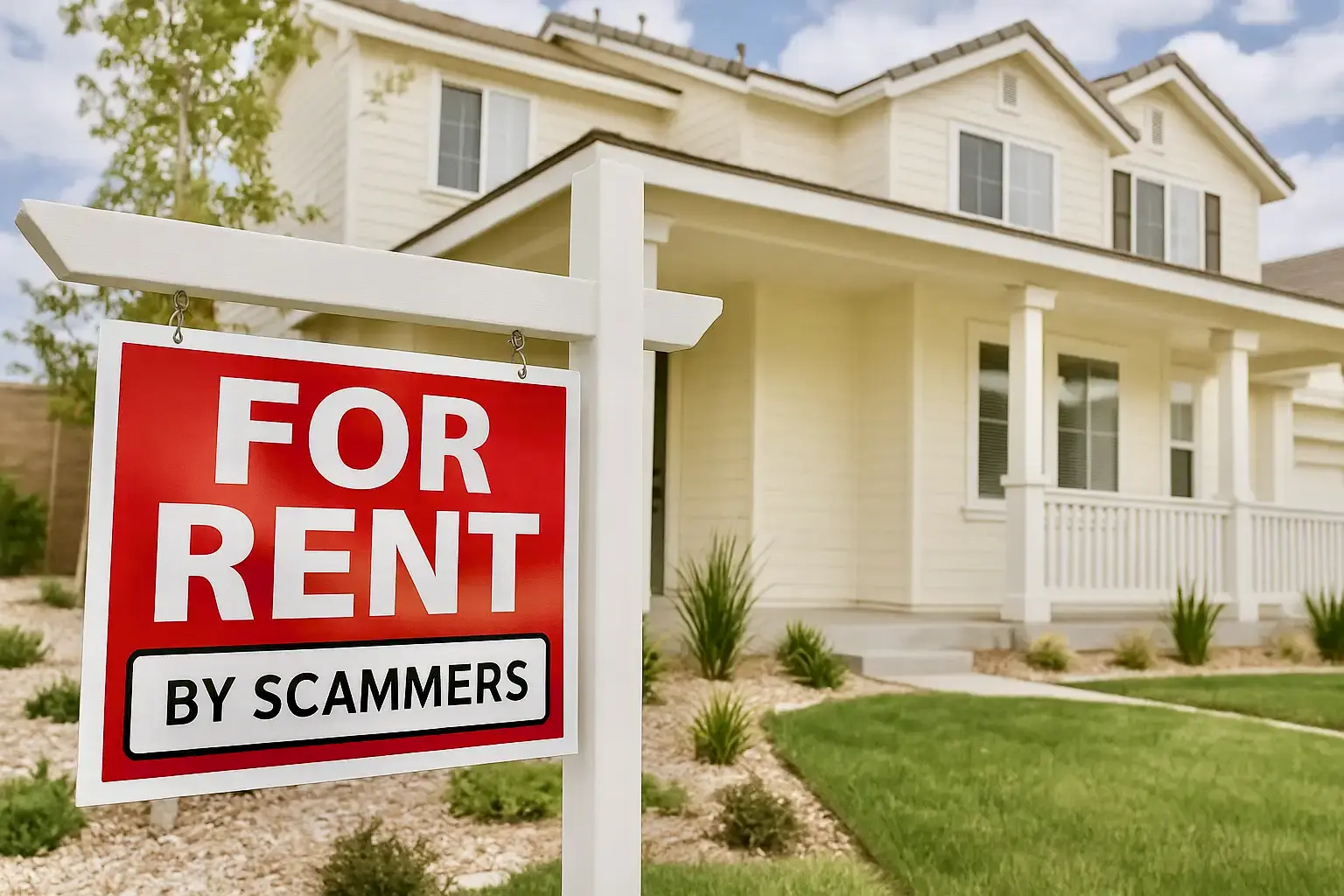Imagine sending a deposit for your dream apartment, only to find out the listing was fake, leaving you out of pocket. In 2023, nearly 10,000 renters lost $145 million to rental scams. Even cautious renters can fall victim to sophisticated scams that thrive in a competitive market, leading to potential identity theft and financial loss.
This guide provides essential tips for identifying red flags, verifying legitimate opportunities, and protecting yourself during your rental search. By knowing common scam tactics and following key verification steps, you can safeguard yourself while looking for your next home.
Key Takeaways
- Rental scams often use fake or hijacked listings with prices that seem too good to be true.
- Never send money or personal info before touring the property and signing a lease.
- Avoid payment methods like wire transfers, gift cards, or cash apps.
- Verify ownership through public records and cross-check listing details online.
- If something feels off, trust your instincts and walk away.
How Rental Scams Work
Rental scams usually fall into two types:
- Listing hijacking: copying legitimate listings and altering contact information.
- Fake listings: Scammers create ads for non-existent or unavailable properties.
Scammers exploit renters' hopes by advertising attractive deals on low-priced rentals and create urgency by claiming high demand from others, pushing you to act fast. Often, they'll provide excuses to prevent in-person viewings, like being out of town, and urge you to pay a deposit quickly to "hold" the property.
Why are rental scams increasing?
The online rental market enables scammers to operate anonymously, exploiting tight housing markets and renters' desperation. A recent survey found that 93% of renters believe rental scams are common, with 90% concerned about becoming victims.
Red Flags That Signal a Rental Scam
Watch for these warning signs when searching for your next home. They may indicate a scammer instead of a legitimate landlord.
Prices Too Good to Be True
A key sign of a rental scam is pricing significantly below market value. Scammers use attractive prices to attract interest and cloud judgment. Always check comparable rentals in the same area to gauge typical prices. If a three-bedroom apartment is the same price as a one-bedroom, that's a major red flag.
Pro tip: Use sites like RentalSource, Zillow, Redfin, Apartments.com, or Rentometer to compare average rents for nearby similar properties.
Landlord Unavailable for In-Person Showings
Legitimate property owners or managers should be willing to show you the property in person. Be cautious of excuses for not allowing in-person viewings, such as the landlord being out of the country. Always tour a property yourself or have a trusted representative before agreeing to rent. Virtual tours can help, but shouldn't replace physical inspections.
Pro tip: If you're moving long-distance and can't visit in person, ask a local friend, real estate agent, or relocation service to view the property.
Requests for Wire Transfers or Unusual Payment Methods
Scammers typically request untraceable payments like wire transfers, cryptocurrency, prepaid cards, gift cards, or cash apps. Be cautious if they request payment before signing a lease or viewing a property.
Legitimate landlords accept personal checks, credit cards, or secure payment portals. They often use property management systems like AppFolio, Buildium, or TurboTenant, which scammers typically can't access. They also usually don't request payment until you've viewed the property and completed an application.
Pressure to Act Quickly
Be wary of tactics that create a false sense of urgency, as scammers commonly use them. Watch out for claims about high interest from multiple parties, imminent price increases, or limited availability. These pressures aim to rush you into a decision before you can verify the listing's legitimacy. Take your time to conduct thorough research; a genuine rental opportunity will still be available after your due diligence.
Vague or Suspicious Listing Details
Fraudulent listings often feature poor grammar, vague descriptions, and low-quality photos. Watch for generic language or content copied from legitimate ads, as these are red flags.
How to Verify a Legitimate Rental Opportunity
Taking proactive steps to verify rental listings can save you from becoming a victim of fraud. Here are essential verification methods every renter should use:
Cross-Check the Listing Online
Search the property's address online to see if it's listed for rent or sale elsewhere. If you find the duplicate listing under a different name or price, or if it's for sale on another site, that's a red flag. Scammers often copy real ads, so look for inconsistencies. If the listing mentions a company, verify it on their website to ensure it's legitimate.
Pro tip: Search parts of the listing description in quotes on Google. If the same ad appears under different contact names or prices, it's likely a scam.
Use Google Street View and Maps
Check the address on Google Maps and use Street View to confirm the property exists and matches the listing photos. For instance, if the listing shows a blue house, Street View displays a white office building, something is off. This step helps verify the location of the listing pictures.
Research Property Ownership Records
Most counties provide online access to property records through the assessor's or recorder's office. Use the property address to find the owner's name. Ask for clarification if it doesn't match someone claiming to be the owner. Legitimate property managers should prove their connection to the actual owner.
Verify Landlord/Property Manager Credentials
For individual landlords, cross-reference their identity with property records. Property management companies verify their legitimacy by checking if they have a physical office location, looking up their business license, reading reviews from other tenants, and verifying their professional associations. Don't rely solely on the contact information provided in the listing.
Conduct In-Person Property Visits
Nothing replaces an in-person property visit. Look for signs indicating it's available for rent.
- Are there current tenants?
- Does the interior match the photos in the listing?
- Is the person showing the property knowledgeable about its features and history?
A legitimate landlord or agent will inquire about your rental needs, provide detailed property information, and explain the application process. They should know all areas of the property and its features.
Protecting Your Money and Personal Information
Stay cautious about money and sensitive information even after verifying a listing, as many scams succeed when renters share funds or personal data too early.
Never Pay Before Signing a Lease and Viewing the Property
Never pay large sums (like a deposit or rent) before seeing the property and having a signed lease. Legitimate rentals shouldn't require payment unseen. Be cautious if a landlord asks for a deposit or rent before signing. Set a no-payment rule without a signed lease and keys, and walk away if pressured.
A common scam tactic involves collecting and disappearing deposits from multiple people for the same property. Legitimate landlords will have you sign a lease and exchange keys on payment or move-in day, not weeks in advance.
Use Secure, Traceable Payment Methods
When paying a deposit or rent, use secure methods like credit cards or checks for a paper trail and fraud protection. The FTC advises using credit cards so that you can dispute fraudulent charges. Avoid cash, wire transfers, or payment apps, as they complicate fund recovery. A legitimate landlord should provide safer payment options.
Be Cautious with Personal Information
When applying for rentals, be cautious about sharing personal information. Avoid sending sensitive data like your SSN or bank statements until you've verified the landlord's legitimacy. Use secure portals or deliver documents in person rather than emailing. Be wary of applications asking for sensitive information before viewing the property, as scammers may try to steal your identity. Legitimate landlords usually require applications post-viewing, often through secure platforms.
Document Everything
During your rental search, keep detailed records of all communications and transactions. Save copies of listings, email correspondence, and agreements in writing. Document phone conversations and take photos during viewings. This documentation is crucial for resolving any issues or reporting scams.
What to Do If You Encounter a Rental Scam
Even with precautions, rental scams can occur. Knowing how to respond can help protect you and others.
Reporting Procedures
If you suspect a rental listing is fraudulent, reporting it can help prevent others from falling victim. Report it to:
- If the listing is on RentalSource, use the "Report this listing" link on the property listing to notify us
- Federal Trade Commission (FTC)
- Internet Crime Complaint Center (IC3)
- Your state's attorney general's office
- Local law enforcement, especially if you've lost money
When reporting, provide as much detail as possible, including the listing URL, communication records, and identifying information about the scammer.
Resources for Victims
If you've fallen victim to a rental scam, these resources can assist:
- Your bank or credit card company may be able to stop or reverse payments if notified quickly
- The FTC's IdentityTheft.gov website offers recovery plans if your personal information was compromised
- Local housing assistance programs can help with emergency housing needs
- Legal aid organizations in your area may offer free consultation for rental scam victims
Many communities also have tenant rights organizations that can connect you with resources specific to your situation.
Conclusion
Safely navigating the rental market takes vigilance, verification, and a healthy dose of skepticism. By recognizing common scam tactics, you protect yourself from fraud. Remember, legitimate landlords value responsible tenants and should support your verification efforts. Always view properties in person, verify ownership, use secure payment methods, and trust your instincts. Document all communications, be cautious of too-good-to-be-true listings, and report suspected scams to protect others.







